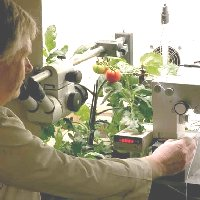New irrigation system saves water

New irrigation system saves water and improves quality of fruit.
Scientists at Lancaster University have helped develop a new irrigation system that could more than halve agriculture's consumption of water. The technique, which has become known as Partial Root Drying (PRD), can also enhance the flavour and quality of fruit crops, enhance flowering and may be used to beneficially modify the shapes of trees and other perennial crops.
The PRD technique evolved from work on root-to-shoot signalling conducted at Lancaster University by Professor Bill Davies and colleagues. The Lancaster group discovered that plants have the capacity to measure the amount of water available to them around the root system and showed that they will communicate this information to their shoots in the form of a chemical signal. When some roots encounter dry soil, the signal will act to reduce water loss and shoot growth and as a result will help to sustain a favourable water status in the plant. PRD allows the exploitation of the plant's signalling system to the farmers' benefit.
Professor Davies said: 'Partial Root Drying is a way of manipulating water use and crop growth without genetic manipulation. Significant benefits can be obtained without the use of high technology and so the method can be of enormous benefit in agricultural systems of developing countries. Given that 70 % of the world's water goes to grow crops and that climate change may result in water being an even more scarce resource, PRD can have significant agricultural effects and social consequences especially for many developing countries.' As part of the EU-funded work on PRD, Professor Murray Saunders a Lancaster social scientist, is assessing the likely social impacts of the introduction of the new irrigation systems in the Mediterranean region.
The Lancaster group first experimented with apple trees, watering half the roots whilst leaving the other half to dry out. Dry roots were found to release abscisic acid, a stress hormone that signals the plant to inhibit leaf growth and close pores in the leaves through which water is lost. Significant saving of irrigation water was achieved. In contrast to other deficit-based irrigation systems, the PRD effects on plant signalling acted to keep the plants well charged with water and therefore leaves and fruit did not experience damaging water deficits. Most importantly, it seemed likely that with leaf formation suppressed, sugars would be redirected to the fruit, sustaining fruit growth and maintaining or improving fruit flavour.
Scientists at CSIRO Australia and at the University of Adelaide conducted the first commercial trials of PRD on grapevines. They showed that a halving of water use applied using the PRD technique did not reduce yield but that flavour and colour of grapes was improved. Further work by this group has convinced the powerful winegrape industry in South Australia to employ the PRD irrigation system in many new vinyards. The system has allowed big increases in the efficiency with which water is used, reduced pruning costs and is resulting in an increase in the quality of wine produced. Much of the work has been done by Drs Brian Loveys and Peter Dry of the Australian Government?s Co-operative Research Centre for Viticulture set up between the Industry, CSIRO and the University. The group is now investigating the effects of PRD on crops other than wine grape.
Professor Davies and his colleague, Dr Mark Bacon at Lancaster, co-ordinate an EU-funded consortium to investigate the effects of PRD on a range of crops (including citrus fruits, olives, tomatoes and cotton) around the Mediterranean. UK trials are currently being conducted on raspberries. The latest results from Cukurova University in Turkey show that PRD can result in very significant savings in the use of water for the production of cotton. Professor Cevat Kirda and his team have shown that the PRD cotton crop produced its commercial yield several weeks early than the conventional crop, thereby increasing the chances of quality cotton yield before the autumn rainy season.
Additional Lancaster work funded by MAFF has shown that PRD can be applied to potted ornamental nursery stock to reduce water use in UK horticulture. Controlled soil drying can beneficially modify plant shape, making plants more compact and bushy, both characteristics that can increase the value of the plant. Horticultural water use is a major issue for the UK as the climate changes.